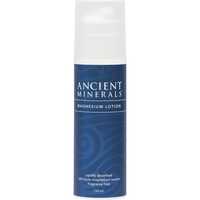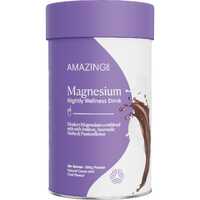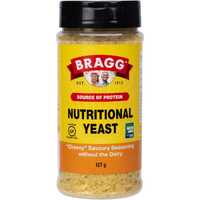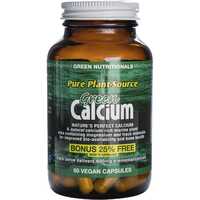The human body needs certain micronutrients to survive, including vitamins and minerals. We only require small amounts of these compounds, but they're absolutely essential to our health and longevity. Seven macrominerals are needed for every healthy diet, along with many trace minerals, depending on how they're defined.
In this article — the second of a two-part series — we'll review essential dietary minerals and the important role they play. We'll look at the differences between mineral types before reviewing major minerals and the foods that contain them.
What are Minerals?
A dietary mineral is an inorganic chemical element that's needed to sustain human life. These compounds come from the soil and water, and they perform numerous roles throughout the body. From producing enzymes and regulating hormones to promoting growth and development, minerals are vital to many aspects of human life.
Unlike vitamins and other nutrients, minerals maintain their physical integrity when exposed to air, heat, or acid. They're absorbed by plants and consumed by animals, which makes them available to humans. The best way to get minerals into your body is to eat natural foods rich in specific chemicals. When adequate quantities are not available through direct sources, they can be added to various foods or taken as supplements.
What Minerals Are Essential?
There are seven major essential minerals and many essential trace minerals, depending on how they're defined. The major, or macrominerals, are calcium, phosphorus, potassium, sodium, magnesium, chloride, and sulphur. A variety of trace minerals are also essential to human health, including iron, chromium, cobalt, copper, zinc, manganese, molybdenum, iodine, and selenium. The human body needs larger quantities of macrominerals and very small quantities of trace minerals.
Other dietary minerals also exist, but there's a diversity of opinion regarding the essential nature of these elements. For example, very small quantities of silicon, boron, and arsenic are thought to play a role in human health, but the exact biochemical nature and function of these elements remains unknown. These substances are often present at extremely low concentrations, and they're referred to as ultratrace elements.
Essential Minerals to Human Health
The following seven macrominerals are known to play an essential role in human health. It's important to consume these elements on a regular basis to ensure a healthy, balanced diet:
Calcium
Calcium is a macromineral known for building strong teeth and bones. This essential mineral also supports the healthy functioning of nerves, muscles, and heart tissue. Like most of the other minerals on this list, calcium combines with other nutrients to support basic life functions. It works with phosphate and magnesium to give your bones structure, and it has close links with phosphorous and vitamins D and K.
Calcium is present in many foods, especially seafood and dairy products. You'll find lots of calcium in sardines, salmon, cheese, milk, yoghurt, and tofu. It's also present in fortified milk and soy products, along with nuts, seeds, and some leafy green vegetables. To absorb calcium properly, your body needs vitamin D, which comes through sunlight, supplements, fatty fish, and fortified milk products.
Phosphorus
After calcium, phosphorus is the most abundant mineral in the body. It works closely with calcium to build strong teeth and bones, and it helps your body to utilise the macronutrients protein, carbohydrate, and fat. Phosphorus is an essential ingredient for making protein, which is used for growth, maintenance, and repair throughout your body.
Phosphorus can be found in lots of foods, particularly protein-rich foods such as red meat, poultry, seafood, nuts, lentils, and beans. Eggs are also high in phosphorus, as are most dairy products. If you don't get enough of this mineral in your diet, it can be found in fortified foods and supplements. Phosphorus helps to maximise the benefits of other nutrients, and it's often included in supplements with vitamin D, iodine, magnesium, and zinc.
Sulphur
Sulphur is the third most abundant mineral in your body, behind calcium and phosphorus. This mineral is present in the compounds methionine and cysteine, which are two of the amino acids used to make proteins. These substances can be found all over the body, and they help to keep your tissues strong and flexible. Along with building and repairing DNA, sulphur also helps to protect your cells, skin, tendons, and ligaments from damage.
The main dietary sources of sulphur include cruciferous vegetables like broccoli and cauliflower, nuts and seeds, and dairy products. It's also present in animal proteins, including red meat, poultry, seafood, and most types of fish. Legumes can be a great source of sulphur for vegetarians and vegans, especially soybeans, black beans, kidney beans, split peas, and white beans.
Potassium
Potassium is a versatile mineral needed for many life processes. Among other things, it helps your nerves, muscles, and heart to function properly. This essential mineral helps to transport other nutrients around your body, and it also plays a role in waste management. The right amount of potassium helps to support cardiovascular health, protect against osteoporosis, and prevent kidney stones.
Potassium is present in many plant-based foods, including apricots, avocados, apples, bananas, tomatoes, carrots, sweet potatoes, and leafy greens. Unlike some of the other minerals on this list, too much potassium can be a very bad thing. High levels of this mineral can lead to hyperkalaemia, which is a serious and potentially life-threatening condition. For this reason, you should only take potassium supplements after speaking to your doctor.
Chloride
Chloride is a mineral found naturally in various foods. It mostly comes in the form of sodium chloride, which is also known as table salt. Along with sodium and potassium, chloride is classified as an electrolyte and carries an electric charge. This mineral creates specific channels in your cell membranes, which are needed to carry out vital tasks. It helps to control how water and nutrients move between your cells, and it also aids with muscle and heart contraction, nerve messaging, and oxygen exchange.
Chloride is available from numerous sources; in fact, it's present naturally in all unprocessed foods. Healthy chloride-rich foods include seaweed, rye bread, tomatoes, lettuce, celery, canned fish, and olives. Some foods need to be limited due to their high chloride content, including soy sauce, processed condiments, and processed meat products. We get most of our chloride intake from table salt and food additives, and this mineral is also produced during cooking and food processing.
Sodium
Sodium is a dietary mineral that's required for various muscle and nerve functions. It's similar in many ways to chloride and potassium, as it creates specific channels in the membranes of your cells. From water content to amino acids, glucose, and vitamins, it helps to transport and regulate a wide range of biological compounds. Sodium is also important for muscle and heart contraction, and it's used to carry messages between the brain and body.
Sodium can be found in many common foods, including plant- and animal-based sources. Just like chloride, however, you don't want to consume too much of it. Healthy sodium-rich foods include nuts, seeds, fermented foods, olives, pickles, cottage cheese, and canned beans. If you want to raise your sodium levels naturally without eating too many processed foods, you can add salt to your food or drink sports drinks that contain electrolytes.
Magnesium
Magnesium is essential for healthy muscles, nerves, and bones. It helps to keep your blood sugar and blood pressure at an optimal level, and it makes essential proteins for cells, tissues, and bones throughout your body. Magnesium is a co-factor in more than 300 enzyme systems, which produce energy and regulate biochemical reactions across the body. Roughly 50-60% of the magnesium in your body exists in your bones, with the rest of it residing in soft tissues.
Magnesium can be found in lots of plant-based foods, and it's also a common ingredient in fortified breakfast cereals and supplements. Foods high in magnesium include nuts, seeds, whole grains, legumes, and green leafy vegetables. Magnesium is concentrated in pumpkin seeds, chia seeds, almonds, cashews, and spinach. If you don't get enough magnesium in your diet over a long period of time, you may be at risk of heart attack, stroke, diabetes, and osteoporosis.
If you're looking for natural whole foods, quality ingredients, and natural supplements infused with minerals, you've come to the right place. From nuts and seeds to protein powders and superfoods, we have all the dietary minerals you need to live a long and happy life. Check out our website today or contact our team to learn more.


 Certified Organic
Certified Organic Vegan Friendly
Vegan Friendly  Vegetarian
Vegetarian Organic Ingredients
Organic Ingredients Dairy Free
Dairy Free Gluten Free
Gluten Free Keto Friendly
Keto Friendly


































